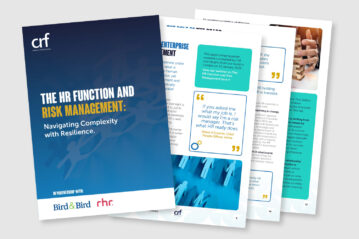Leading a business often means trying to achieve complex and sometimes contradictory objectives. Enabling a company to be financially successful while also satisfying sustainability and corporate responsibility ambitions means leaders face what can feel like intractable problems. However, providing great leadership in these circumstances doesn’t start with knowing how to make things happen. It starts with knowing yourself.
Self-awareness has always been part of being a leader, but research from Corporate Research Forum (CRF), sponsored by RHR International, has shown that the post-pandemic shift in the qualities required to lead has made self-awareness more important than ever. Those at the top table need to reconsider their approach. They need to think again about how they set direction for their business; build their organizations; and lead, motivate, and look after their workforce.
The behaviors and actions of senior leaders are particularly important. How they think, react, and behave influences company-wide culture. A reflective, self-aware figure at this level is a great role model. They encourage their people to embrace self-knowledge and become more effective managers. Certainly, the post-pandemic organization requires more humanity from its leaders. Self-awareness is fundamental here, but it goes further. It’s the building block for everything else.
Forbes has described self-awareness as a key to leadership excellence, helping leaders create value and influence others. Self-awareness, it says, gives clarity, empowerment, motivation, and positive energy. Earlier this year, CEOWORLD Magazine’s insight into how leadership would evolve cited self-awareness as a critical part of the emotional intelligence required for leaders to be compassionate. RHR Senior Partner David Astorino agrees, saying, “Letting go of unhelpful stories such as fear of failure or the need to be perfect and developing openness to experience, curiosity, and the humility to seek out others’ viewpoints are essential.”
Today’s leaders need to show transparency in their communications and consistency in their actions and intentions. They need to deliver effective support to every employee, even if they’re working remotely. Again, self-awareness is critical here because through understanding your own behavior, impact, strengths, and weaknesses, you’ll understand how to give each employee what they need based on their unique situation.
Without self-awareness, leaders won’t be able to lead effectively. Right now, businesses are not going far enough. To ensure their leaders have the right skills, there needs to be a paradigm shift in the leadership development they offer. CRF’s report says leaders should go through an “inner journey” to develop effective skills. Simon Callow, senior partner at RHR and CRF report contributor, says: “Learning to speak up, give honest feedback, and address issues in a transparent and nonpassive-aggressive way are still some of the most frequent workshop requests we receive. All of these traits come from self-insight.”
Find out more about the paradigm shift in leadership development and what other traits make you a more effective leader by downloading the full CRF report below.













